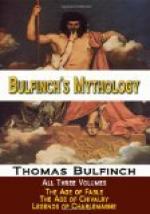Erebus, son of Chaos, region of darkness, entrance to Hades
Eridanus, river
Erinys, one of the Furies
Eriphyle, sister of Polynices, bribed to decide on war, in which her husband was slain
Eris (Discordia), goddess of discord. At the wedding of Peleus and Thetis, Eris being uninvited threw into the gathering an apple “For the Fairest,” which was claimed by Hera (Juno), Aphrodite (Venus) and Athena (Minerva) Paris, being called upon for judgment, awarded it to Aphrodite
Erisichthon, an unbeliever, punished by famine
Eros See Cupid
Erytheia, island
Eryx, a mount, haunt of Venus
Esepus, river in Paphlagonia
Estrildis, wife of Locrine, supplanting divorced Guendolen
Eteocles, son of Oeipus and Jocasta
Etruscans, ancient people of Italy,
Etzel, king of the Huns
Euboic Sea, where Hercules threw Lichas, who brought him the poisoned shirt of Nessus
Eude, king of Aquitaine, ally of Charles Martel
Eumaeus, swineherd of Aeeas
Eumenides, also called Erinnyes, and by the Romans
Furiae or
Diraae, the Avenging Deities, See Furies
Euphorbus, a Trojan, killed by Menelaus
Euphros’yne, one of the Graces
Europa, daughter of the Phoenician king Agenor, by Zeus the mother of Minos, Rhadamanthus, and Sarpedon
Eurus, the East wind
Euyalus, a gallant Trojan soldier, who with Nisus
entered the
Grecian camp, both being slain,
Eurydice, wife of Orpheus, who, fleeing from an admirer, was killed by a snake and borne to Tartarus, where Orpheus sought her and was permitted to bring her to earth if he would not look back at her following him, but he did, and she returned to the Shades,
Eurylochus, a companion of Ulysses,
Eurynome, female Titan, wife of Ophlon
Eurystheus, taskmaster of Hercules,
Eurytion, a Centaur (See Hippodamia),
Euterpe, Muse who presided over music,
Evadne, wife of Capaneus, who flung herself upon his funeral pile and perished with him
Evander, Arcadian chief, befriending Aeneas in Italy,
Evnissyen, quarrelsome brother of Branwen,
Excalibar, sword of King Arthur,
F
Fafner, a giant turned dragon, treasure stealer, by
the Solar
Theory simply the Darkness who steals the day,
Falerina, an enchantress,
Fasolt, a giant, brother of Fafner, and killed by him,
“Fasti,” Ovid’s, a mythological poetic calendar,
Fata Morgana, a mirage
Fates, the three, described as daughters of Night—to indicate the darkness and obscurity of human destiny—or of Zeus and Themis, that is, “daughters of the just heavens” they were Clo’tho, who spun the thread of life, Lach’esis, who held the thread and fixed its length and At’ropos, who cut it off




